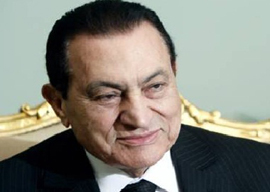
February 04, 2011

Hosni Mubarak
Hosni Mubarak, it appears, is not going to go quietly, or quickly.
He is not going to play the role assigned him in the White House script that has him resigning and fleeing Egypt in the face of mass demonstrations in Tahrir Square.
After U.S. diplomat Frank Wisner came to give Mubarak his marching orders, the Egyptian apparently decided that, if the Americans, whose water he has carried for years, are going to abandon him, he will play out this hand himself. And the old fighter pilot is not without cards to play.
While the army has said it will not fire on the demonstrators, the army also seems to want an end to the demonstrations—and appears reluctant to dump over a president who has been a friend and patron for decades.
And now that Mubarak has pledged on national television that he will not run again, and elections will be held in September, the cause that united the crowd—Mubarak must go!—appears victorious. Indeed, some demonstrators took Mubarak’s announced departure as victory and went home. Why start an insurrection to deny the man his last six months?
Wednesday, Mubarak played another card—his own “people power.”
Mobs of toughs pushed into Tahrir Square, throwing bricks, bottles and rocks, and using whips to drive out the remnant of Tuesday’s “million-man march.” The army did nothing.
The ball is now in the democracy demonstrators’ court.
If, as Mohamed ElBaradei has proclaimed, today is Departure Day for Mubarak, it is also D-Day for them. If the army balks, they will have to force the president of Egypt out of power themselves.
How do they do this if Mubarak stands his ground and the army stays neutral? Will the demonstrators keep bringing women, children and elderly into Tahrir Square when there is the possibility of a riot that could get them injured or killed?
Some demonstrators feel they have won and ought not press on.
The rest seem to have no clear leader, no compelling slogan, no agreed-upon agenda, other than that Mubarak must go. ElBaradei is seen as an international bureaucrat and opportunist more at home in Viennese cafe society than Cairo, who flew in to lead a revolution he did nothing to bring about.